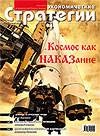Space Like a Punishment
Opening address of editor-in-chief.

Opening address of editor-in-chief.
How our success was forged and what we need to do in order to make Russia retain the status of space superpower — all this is covered in the interview with the “Economic strategies” of the Board of Directors Chairman of CJSC “Rosobschemash” corporation, Minister of the USSR General Engineering in 1983–1988 (Aerospace industry of the USSR), one of the founders of the nuclear-missile shield of the country, of the orbital space station “Mir” and “Energia–Buran” system, Hero of Socialist Labor, winner of the Lenin Prize, the Prize of the RF Government named after Yuri Gagarin for his merits in the field of space Oleg D. Baklanov.
Efficient use of space technologies and systems enables us to construct a model of techno-mediated social-economic progress, which will determine the format of states’ and corporations’ dominance in strategic business areas. Space is becoming a bifurcation point of conservation — of real-national sovereignty of those countries that are interested in it and can afford it. It is necessary to form a comprehensive space activity strategy for concentration of the Russian competitiveness key factors in the struggle for dominance in the world economy.
Georgy Grechko — an iconic figure in the national space industry. He flew into space three times, each time achieving unique scientific results. Twice Hero of the Soviet Union, pilot-cosmonaut of the USSR, doctor of physical and mathematical sciences, professor, he worked with Korolev, trained with Gagarin, repeatedly broke record of flight duration and became the oldest astronaut who visited the orbit. His friends and colleagues also know him as a great prankster and joker, but few know that he is one of the most romantic cosmonauts: among the stars he seeks an opportunity not only to make another scientific experiment, but also to learn something new, unusual, and maybe even to meet our intellect brothers. Today it is his main dream.
Importance of problems solved by the Russian space industry determines application of the most modern management tools. Industry Situation Centre ensures a high level of aerospace industry competitiveness, development sustainability and holistic coverage of problem situations in making command decisions. The paper deals with its distinctive features in the system of distributed situation centers.
Over half a century passed since a man first visited the extraterrestrial space. From this moment — April 12, 1961 — mankind began its placement in outer space, inevitability of which was predicted by the founder of theoretical astronautics Konstantin E. Tsiolkovsky. Since then, more than 500 people have visited the space, large-scale space experiments are conducted, programs of conquering the Moon and Mars are being developed. In order to survive humanity must be ready to space expansion, believes cosmonaut-investigator Sergey Krichevsky, Doctor of Philosophy and Doctor of Technical Sciences, professor of the Russian Academy of Public Administration under the President of the Russian Federation. However, for the time being we are completely unprepared to settling outside the Earth.
World in the XXI century is a world of unprecedented changes. International relations are undergoing radical transformation too. Although mankind still witnesses unhealthy and humiliating polarization, existence of billion of poor people, abuse of law, veiled or provoking violence against those who are weaker, the old world nevertheless retreats. Getting rid of these “gifts” of the past is a difficult and long matter. The situation is like this also because these shifts are hampered by the West, primarily by the USA and its suzerains. Washington is trying to prolong the unipolar world — Pax Americana, which entered into the terminal phase of hopeless crisis. But the world has seriously changed: it crossed the line where hegemonies were still possible and untouchable. That’s why Pax Americana’s lifecycle is so short, almost fleeting. History now overtakes Empires much faster….
Emirate of Qatar, small in area and population, being a coastal state of the Persian Gulf, from year to year is demonstrating dynamic economic growth thanks to constantly growing income from hydrocarbon exports. According to experts of the British audit firm Ernst&Young and the Oxford Economics Institute, Qatar has topped the rating of the fastest growing markets in 2000-2010. The author particularly analyzes dynamics of the main socio-economic indicators of the country during the 2000s and also describes important provisions of the national government programs for medium and long-term periods. The study presents conclusions regarding the present situation and prospects of emirate’s economic development in the future.
The article analyzes trends and causes of the fertility decline in the intercensal period of 2002–2010 and temporary increase of the total birth rate in 2007–2014 from 1,3 to 1,7 children per woman due to improving implementation conditions of the existing need of the family mainly for two children by increasing child allowances and introducing “maternity capital”. The article discusses objectives and means of enhancing familydemographic state policy in connection with the upcoming in 2015–2025 reduction in reproductive 18–34 years old cohorts and continuing attenuation of family need for children and decrease of individual reproductive values.
The article presents a comparative analysis of various forecast options of major demographic indicators dynamics for Russia up to 2030. Data of Rosstat and the UNO forecasts are used. Assumptions underlying forecasts are analyzed and possible dynamics of fertility and mortality indicators are assessed. The article also examines, based on the index method, the contribution of various birth-rate components (fertility intensity, proportion of reproductive age women and the age structure of reproductive contingent) in the overall dynamics of this indicator.